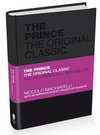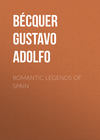Kitabı oku: «Spanish Highways and Byways», sayfa 10
XII
MURILLO'S CHERUBS
"Angels o'er the palm trees flying,
Touch their waving fronds to rest.
Bid them give no wind replying.
Jesus sleeps on Mary's breast.
Blesséd angels, hold the peeping
Branches still as altar-place,
For the Holy Child is sleeping
Close beneath His Mother's face."
– Lope de Vega.
Spanish love for childhood, and the precocity and winsomeness of Spanish children, impressed me from my first hour in the Peninsula. "There is no road so level as to be without rough places," and the initial days of my Madrid residence, after my artist comrade had gone back to Paris and the spring salons, might have been a trifle lonely save for baby society. I was living in a delightful Spanish household, but the very excess of courtesy reminded me continually that I was a Yankee and a heretic. As time passed, friendship ripened, and it is to-day no empty form of words when I am assured that I have "my house in Madrid." But at the outset I felt myself not only an American alien, but an Andalusian exile. The "only Court" is such a prosaic contrast to Seville that my impulse was to betake myself with books to the great park of the Buen Retiro, the magnificent gift of Olivares to his royal master, and let the Madrid world, at least the adult portion of it, go by. For while the larger Madrileños were busy with their own plays of politics, bull-fights, and flirtation, the little ones had happy afternoons in that historic park of many a tragedy, where convents, palaces, and fortifications have all made way for the children's romping ground. Resting on a rustic seat in the leafy shade, with the rich, thrilling notes of the nightingale answering the bell call of the cuckoo from the deeper groves beyond, I could watch these budding Spaniards to heart's content.
It was well to observe them from a distance, however, for their young voices were of the shrillest. Among the boys, an energetic few were developing muscle by tag and leap-frog; more were flying kites, cracking whips, twirling slings, and brandishing the terrors of pewter swords; while at every turn, beside some flashing fountain or beneath some spreading oak, I would come upon a group of urchins playing al toro with the cheap, gaudy capes of red and yellow manufactured for the children's sport. The girls were skipping rope, rolling hoop, teaching one another the steps of endless dances, and whispering momentous secrets in statue-guarded grottos, or thickets of flowering shrubs, or whatsoever safe, mysterious nook their fluttering search could find.
Here was a school out for its daily airing, a pretty procession of rainbow-clad little damsels, marshalled by the black-veiled figures of graceful nuns, and pacing with all decorum down a crowded avenue; but the moment the troop turned into some sequestered by-path, how it would break into a shimmering confusion of butterflies, darting hither and thither in those jewel-green lights and sea-green shadows, the nuns casting their dignity to the winds and scampering with the swiftest! Wandering after I would come, perhaps, upon an open space where the smaller boys were gathered, delicate little lads riding horse-headed sticks, digging with mimic spades, and tossing big, soft, red and yellow balls, while mothers and nurses sat about in circle on the stone benches, calling out sharp-toned cautions to their respective charges.
And everywhere in the park were toddling babies, clasping dolls, tugging at gay balloons, dragging wooden donkeys on wheels, and tumbling over live puppies. They were pale, engaging, persistent little creatures, with a true Spanish inability to learn from experience. I saw one aristocratic cherub, white as snow from feathered cap to ribboned shoes, take ten successive slappings because he muddied his hands. The angry nurse would make a snatch for the naughty fingers, roughly beat off the dirt, and cuff the culprit soundly. His proud little mouth would tremble; he would wink hard and fast, but there was not a tear to be seen, not a cry to be heard, and no sooner had her peasant clutch released him than back went the baby hands, grubbing deep into the mire. A gorgeous civil guard finally distracted her attention, and the last view I had of the child showed him blissfully squatted in the very middle of a puddle, splashing with arms and legs.
White is almost the universal wear of the prattling age in the Buen Retiro, although now and then some lily fairy would flit by with saffron sash and harmonious saffron stockings, or costume similarly touched by pink or blue. The Scotch plaids, too, were in favor as sashes, and at rare intervals I encountered a tot sensibly attired in stout plaid frock. But the white of this childish multitude was thickly flecked with mourning suits, complete to bits of black gloves and even to jet studs in the collars. Among the sad sights of the Retiro was an epileptic boy, led and half supported between two sweet-faced, youthful ladies, both in widow's crêpe, who screened him with caresses as his fit took him and he foamed and screamed in piteous helplessness. This pathetic trio, ever seeking seclusion, was ever followed by a retinue of idlers, who, for all their intrusive staring, were silent and sympathetic.
The nursemaids formed not the least attractive feature of the kaleidoscopic picture. Most wore white caps, fastened with gilded pins or knots of rose or russet; but the nurses counted the best, from the mountain province of Santander, were distinguished by bright-colored handkerchiefs twisted about the head. Here, as in the Élysées, baby-wagons are seldom seen. The nurses carry in arms the black-eyed infants, who bite away at their coral necklaces quite like little Yankees.
But Spanish traits soon declare themselves. In the centre of the park is an artificial pond, where lads in their first teens, too old for play, lean languidly over the iron railings, and, while they throw crumbs to the flock of forlorn-looking ducks or watch the dip of the red oar-blades that impel the pleasure boats, brag of their amorous adventures and exchange the scandal of the Prado. Sometimes their love chat is of sweeter tenor, for many of these schoolboys have already spoken their betrothal vows, which the Church will not let them lightly break. Spaniards often marry under twenty-one, and even a recent wedding in Madrid, where neither bride nor bridegroom had reached the fifteenth year, was hardly thought amiss, in view of the fact that there was parental money to maintain them.
And why had the stately city of Valladolid been under a reign of terror for half the week just past, with shutters up, doors barred, and women and children kept at home for safety, while bands of young men swayed in bloody struggle through her famous squares and streets, but because a cadet and a student must needs lose heart to the same maid? Cupid, not Santiago, is the patron saint of Spain. And Cupid, for all his mischief, has some very winning ways. Our boyish sentimentalists of the Buen Retiro, for instance, easily fall into song, and the native melodies, always with something wild and Oriental in their beat, ring across the little lake into the woods beyond till the birds take up the challenge and every tree grows vocal.
One afternoon, on my way to the park, I bought from a roadside vender a handful of small, gaudily bound children's books, and had no sooner found what I fondly supposed was a sequestered seat than a tumult of little folks surrounded me, coaxing to hear the stories. These tales, so taken at random, may throw a little light on the literature of Spanish nurseries. There was the life of the Madonna, which we passed over, as the children said they had read it in school and knew it, every word, already. So we turned to the astonishing career of the great soldier, Kill-Bullet, who could easily stop a cannon-ball against his palm, and to an account of that far-off land where it rained gold in such profusion that nobody would work, until finally all the people, weary of a wealth which induced no tailor to stitch and no shoemaker to cobble, no baker to bake and no dairy-maid to churn, rose by common consent and shovelled the gold into the river. We read of hot-tempered little Ambrose, who left the gate of his garden open, so that a hen cackled in and began to scratch under a rose bush, whereupon the angry boy chased her furiously all over the garden-beds until his summer's work was trampled into ruin, and his papa came and explained to him how disastrous a thing is wrath. There was a companion moral tale for little girls, telling how Inez used to make faces until her mamma told her that she would grow up with a twisted mouth and nobody would marry her, whereat did little Inez promptly reform her manners. One favorite volume, with a cover which displayed a wild-whiskered old ogre in a fiery skullcap gloating over a platterful of very pink baby, told how good little Violet saved her bad sisters, Rose and Daisy, from his dreadful gullet, by aid of an ugly monkey, whom her promised kiss transformed into a fairy prince. I was glad to find, in that country where so little is done to train children in the love of animals, the ancient tale of the four musicians, the donkey, the dog, the cat, and the cock, who escaped in their old age from the death that threatened them at the hands of ungrateful masters and, by a free exercise of their musical talents, captured the house of a robber-band, putting its inmates to confusion and flight. Many of the stories, indeed, would have been recognized by young Americans, but the proportion of saint-lore was larger than that of fairy-lore, and, now and then, some familiar property had suffered a Spanish change, as the invisible cap which had become an invisible cape of the sort used for playing bull-fight.
The nursery rhymes, too, so far as I chanced upon them, were of the universal type with Spanish variations. A Castilian mother plays Peek-a-boo with her baby quite as an English mother does, except that the syllables are Cú? Trás! The father's foot trots the child to a Catholic market.
"Trot, little donkey! Donkey, trot!
We must buy honey to please the pet.
If San Francisco has it not,
We'll go to San Benet."
Baby's toes are counted as the eternal five little pigs, and also thus, with a preliminary tickling of the rosy sole: —
"Here passed a little dove. This one caught it. This one killed it. This one put it on to roast. This one took it off again. And this teeny-teeny-teeny scamp ate it all up!"
Spanish patty-cakes are followed by a Spanish grace.
"Patty-cakes, oh! Patty-cakes, ah!
The sweetest cakes are for dear mama.
Patty-cakes, oh! Patty-cakes, ah!
The hardest pats are for poor papa,
"Bread, O God! Bread, dear God,
For this little child to-day!
Because he's such a baby
He cannot pay his way."
The Spanish nursery seems richer in rhymes than ours. Nurse bends Baby's left hand into a rose-leaf purse, for example, and gives it little taps with one finger after another of Baby's right hand, singing: —
"A penny for Baby's purse
From papa, mama, and nurse.
A penny, a penny to pay!
Let no thief steal it away!"
And then the tiny fist is doubled tight.
When the child, again, is first dressed in short clothes, he is propped up in a corner and coaxed to take his first step with the rhyme: —
"One little step, Baby-boy mine!
Come, Little Man, step up!
And thou shalt have a taste of wine
From Godfather's silver cup."
This rhyming fashion the little ones take with them out of babyhood into their later childhood. The urchin admonishes his whistle: —
"Whistle, whistle, Margarita,
And you'll get a crust of bread,
But if you do not whistle
I'll cut off your little head."
The little girl learns the scales in process of rocking her doll to sleep: —
Don't pin-prick my poor old dolly, Do
Respect my domestic matters. Re
Methinks she grows melancholy, Mi
Fast as her sawdust scatters. Fa
Sole rose of your mama's posy, Sol
Laugh at your mama, so! La
Seal up your eyes all cozy. Si
La Sol Fa Mi Re Do.
With Spanish children, as with ours, Christmas Eve, or Noche Buena, is a season of gleeful excitement. They do not hang up stockings for Santa Claus, but they put out their shoes on the balcony for the Kings of the East, riding high on camel-back, to fill with sweets and playthings. Considerate children, too, put out a handful of straw for the tired beasts who have journeyed so far over the Milky Way. On some balconies the morning sun beholds rocking-horses and rocking-donkeys, make-believe theatres and bull-rings, with toy images of soldiers, bulls and Holy Families; but if the child has been naughty and displeased the Magi, his poor little shoes will stand empty and ashamed.
The dramatic instinct, so strong in Spaniards, is strikingly manifested in the children's games. These little people are devoted to the theatre, too, and may be seen in force at the matinées in the Apolo, Lara, and Zarzuela. Afternoon performances are given only on Sundays and the other Catholic fiestas, which last, numerous enough, are well within reach of the Puritan conscience. At these matinées more than half the seats in the house are occupied by juvenile ticket-holders, from rows of vociferous urchins in the galleries, to round-eyed babies cooing over their nurses' shoulders. If the play is an extravaganza, abounding in magic and misadventure, the rapture of the childish audience is at its height.
The close attention with which mere three-year-olds follow the action is astonishing. "Bonito!" lisping voices cry after each fantastic ballet, and wee white hands twinkle up and down in time with the merry music. When the clown divests himself, one by one, of a score of waistcoats, or successively pulls thirty or forty smiling dairy-maids out of a churn, little arithmeticians all over the house call out the count and dispute his numbers with him. When the dragon spits his shower of sparks, when chairs sidle away from beneath the unfortunates who would sit down or suddenly rise with them toward the ceiling, when signboards whirl, and dinners frisk up chimney, cigars puff out into tall hats, and umbrellas fire off bullets, the hubbub of wonder and delight drowns the voices of the actors.
The house is never still for one single instant. Babies cry wearily, nurses murmur soothingly, mystified innocents pipe out questions, papas rebuke and explain, exasperated old bachelors hiss for silence, saucy boys hiss back for fun – all together the Madrid matinée affords a far better opportunity to study child life than to hear the comedy upon the boards.
The boy king of Spain is, of course, a fascinating figure to his child subjects. We were told at San Sebastian, where the Queen Regent has a summer palace, that on those red-letter days when the king takes a sea dip, children come running from far and near to see him step into the surf, with two stalwart soldiers gripping the royal little fists. And no sooner has the Court returned to the sumptuous, anxious palace of Madrid, than the boy bathers of San Sebastian delight themselves in playing king, mincing down the beach under the pompous military escort that they take turns in furnishing one another.
In Madrid, too, the sightseeing crowds that gather before the royal palace or at the doors of the Iglesia del Buen Suceso, where the Queen Regent, with her "august children," sometimes attends the Salve on Saturday afternoons, are thickly peppered with little folks, eager to "see the king." They are often disappointed, for the precious life is jealously guarded, especially while the Carlist cloud still broods above the throne. During my stay in Madrid, a man with a revolver under his coat was arrested on suspicion in the vestibule of the theatre known as La Comédia, where the queen was passing the evening. Sceptical Madrid shrugged its shoulders and said: "Stuff and nonsense! When the Ministers want the queen to sign a paper that isn't to her liking, they make a great show of devotion and pounce down on some poor devil as an anarchist, to frighten her into being meek and grateful." And, in fact, the prisoner was almost immediately released for lack of any incriminating evidence. For weeks after, nevertheless, the royal movements were more difficult to forecast, and on the daily drives the kinglet was often missing from the family group.
But, undiscouraged, every afternoon the children would fringe the palace side of the Plaza de Oriente, hoping to see the royal carriage go or come with their young sovereign, whose portrait, a wistful, boyish face above a broad lace collar, is printed in one of their school reading books over the inscription, "To the Head of the State honor and obedience are due." Expectant youngsters, in the all-enveloping black pinafores that remind the eye of Paris, with book satchels made of gay carpeting over the shoulder, would shake out their smudgy handkerchiefs, often stamped with the likenesses of famous toreros, and help themselves to one another's hats in readiness to salute; but the elegant landau, preceded by an escort of two horsemen, dashes by so swiftly that their long waiting would be rewarded only by the briefest glimpse of bowing bonnets and of a small gloved hand touching the military cap that shades a childish face.
It is a pale and sober little face as I have seen it, but Madrileños resent this impression and insist that his youthful Majesty is "sturdy enough," and as merry as need be. They say that the buoyancy which he inherits from his father is crossed by strange fits of brooding, due to his mother's blood, but that he is, in the main, a merry-hearted child. Although he has masters for his studies now, his affection still clings to his Austrian governess, whom, none the less, he dearly loves to tease. When she is honored by an invitation to drive with the Queen Regent, for example, Alphonsito hastens to hide her hat and then joins most solicitously in her fluttered search, until her suspicion darts upon him, and his prank breaks down in peals of laughter. Madrid was especially sensitive about him last year, for he, Alfonso XIII, godson of Pope Leo XIII, was thirteen years of age – an iteration of the unlucky omen that really ought to be satisfied with the loss of the Spanish colonies. His mother, in honor of his birthday, May seventeenth, distributed five thousand dollars among orphan asylums and other charities, and held a grand reception in the Hall of the Ambassadors, where the slight lad in cadet uniform, enthroned beside the Queen Regent between the two great lions of gilded bronze, received the congratulations of a long procession of bowing ministers, admirals, captain generals, prelates, and those haughty grandees of Spain whose ancient privilege it is to wear their hats in the royal presence; but the shrinkage of his realm since his last birthday must have been uppermost in the mind of even the young lord of the festival. Pobrecito! one wonders what thoughts go on behind those serious brows of his, when, for instance, he looks down from his palace windows at the daily ceremony of guard-mounting in the courtyard. It is such a gallant sight; the martial music is so stirring; the cavalry in blue and silver sit their white steeds so proudly, with the sun glistening on their drawn swords and the wind tossing their long, white, horsehair plumes, that all these tales of defeat and loss must puzzle the sore boy heart and cast confusing shadows down the path before him.
Little as the Spaniards love the Queen Regent, to whom they cannot pardon her two cardinal offences of being a "foreigner" and of disliking the bull-fight, they have a certain affection for Alfonso XIII, "the only child born a king since Christ." Indeed, Spain seems to have been always sympathetic toward childhood in palaces. Enter this wonderful Armería of Madrid, where those plumed and armored kings, on richly caparisoned chargers, whom we have come to know in the paintings of the Museo del Prado, seem to have leapt from the canvases to greet us here in still more lifelike guise, albeit not over graciously, with horse reined back and mighty lance at poise. Any fine morning they may all come clattering out into the Plaza de Armas– and where will the United States be then? Here stands a majestic row of them – Philip II, in a resplendent suit of gold-inlaid plate-armor; Maximilian, whose visor gives him the fierce hooked beak of an eagle; Sebastian of Portugal, with nymphs embossed in cunning work on his rich breastplate; and Charles V, three times over, in varieties of imperial magnificence.
But opposite these stern warriors is a hollow square of boy princes, and of noble niños whose visors hide their identities in long oblivion. The armor of these childish figures is daintily wrought, with tender touches of ruffs and cuffs, scallops and flutings and rosettes. Often only the upper half of the body is incased in steel, the slender legs playing the dandy in puffed trousers of striped velvet – scarlet, green, and buff – silk hose, and satin slippers. Little Philip III proudly displays a diminutive round shield, with a relief of battle scenes in gold. The plate armor of little Philip IV is stamped with lions and castles, eagles and spears. And his little son, Don Baltasar Carlos, bestrides a spirited pony and wears at the back of his helmet a tuft of garnet feathers.
The Prado galleries abound in royal children. This same infante, Don Baltasar, is seen here in the foreground of a lonely landscape, with desolate blue hills beyond and driving clouds above. But all the more bright and winsome glows the form of the six-year-old horseman, the gold-fringed, pink sash that crosses his breast streaming out far behind with the speed of his fearless gallop. Supreme among the Prado children, of course, is the little daughter of Philip IV, the central figure of the world-renowned Las Meninas. All in vain does her charming maid of honor kneel to her with the golden cup; all in vain does the dwarf tease the drowsy dog. The solemn puss, undiverted, will not stir from her pose nor alter the set of her small features until the artist, standing half disdainfully before his easel, gives the word. She has waited for it now hard upon two hundred and fifty years, but the centuries beat in vain against that inflexible bit of propriety.
Even the royal burial vaults beneath the grim Escorial have in their chill grandeur of marble halls an especial Panteon for babies, princely innocents whose lives are reckoned in months more often than in years. Gold and blue and red brighten their great white sepulchre, and above the altar smiles the Christ Child, with the graven words, "Suffer the children to come unto me." But for Alfonso XIII a sombre sarcophagus waits in the haughtiest and gloomiest of all the Panteons, where only kings, and queens who were mothers of kings, may lie.
It is not royal childhood alone that is dear to this strange, romantic, monstrously inconsistent heart of Spain. The cruelty of Spaniards to horses and donkeys sickens even the roughest Englishman, yet almost every voice softens in speaking to a child, and during my six months in Spanish cities I saw nothing of that street brutality toward the little ones which forces itself upon daily notice in Liverpool and London. Spanish children are too often ill-cared for, but despite the abuses of ignorant motherhood and fatherhood, such vivid, vivacious, bewitching little people as they are! Enter a Spanish schoolroom and see how vehemently the small brown hands are wagged in air, how the black eyes dance and the dimples play, what a stir and bustle, what a young exuberance of energy! They race to the blackboards like colts out at pasture. They laugh at everything, these sons of "the grave Spaniard," and even the teacher will duck his head behind the desk for a half-hidden ecstasy over some dunce's blunder or some rogue's detected trick.
But their high spirits never make them unmindful of those courtesies of life in which they have been so carefully trained. There is an old-fashioned exaggeration about their set phrases of politeness. Just as the casual caller kisses the lady's feet, in words, and she reciprocates by a verbal kissing of his hand, so the school children respond to the roll call with a glib: "Your servant, sir." Ask a well-bred boy his name, and he rattles back, "Jesus Herrera y La-Chica, at the service of God and yourself." They learn these amenities of speech with their first lispings. I was much taken aback one day in Seville by a child of eighteen months. Not in the least expecting this infant, whose rosy face was bashfully snuggled into his young aunt's neck, to understand, I said to her, "What a fine little fellow!" Whereupon Master Roly-poly suddenly sat up straight on her arm, ducked his head in my direction, and gravely enunciated, "Es favor que Usted me hace" – "It is a compliment you pay me." I could hardly recover from the shock in time to make the stereotyped rejoinder, "No es favor, es justicia" – "No compliment, but the truth." To this Don Chubbykins sweetly returned, "Mil gracias" – "A thousand thanks," and I closed this uncanny dialogue with the due response, "No las merece" – "It does not merit them."
Servants, neighbors, passers-by, beggars, all prompt the children in these shibboleths of good manners, adorning the precept with example. "Would you like to go with us to the picture gallery this afternoon?" I once asked a laddie of artistic tastes at a boarding-house table. "Si, señora," he replied, whereupon several of the boarders, greatly scandalized, hastened to remind him, but in the gentlest of tones, of the essential addition, "con mucho gusto" to which we were bound to reply, "The pleasure will be ours." The girls, even more than the boys, are bred in these formal fashions of intercourse. Every morning they ask if you have rested well, and express grief or gratification, according to your response. In Mrs. Gulick's school, mere midgets of six and eight, returning from class, will not close the doors of their rooms if you are in sight, though perhaps seated at a reading table in the farther end of the corridor, lest they should appear inhospitable. On our return from Italica, a thirsty child of seven, heated to exhaustion with the sun and fun of that Andalusian picnic, refused to touch the anise-seed water which some good Samaritan had handed up to the dusty carriage, until the glass had been offered to every one else, driver included, leaving, in the sequel, little enough for her. On our midnight return from the Feria, this same niña of gentle memory, staggering and half crying with sleepiness, would nevertheless not precede any of her elders in entering the home door. "After you," she sobbed, with hardly voice enough to add, "And may you all rest well!" "The same to you," chorussed the adults, trooping by, and her faint murmur followed, "Many thanks."
"Shall I give you this fan when I go away," I asked her once, "or would you rather have it now to take to the party?" She wanted it then and there, but what she answered was, "I shall be best pleased to take it when you like best to give it."
You must beware of saying to a little Spanish maid, "What a beautiful rosebud in your hair!" Instantly the hand is busy with the pins. "It is at your disposal." You hastily protest, "A thousand thanks, but no, no, no! It is very well placed where it is." Off comes the flower, notwithstanding, and is fastened into your belt. For when the elder sister has insisted on giving you (until the next ball) those dancing slippers which you so rashly admired, and the sister's novio went home the night before without his cloak, because you had approved its colors (although he sent his man around for it before breakfast), what can the children do but follow suit? Even their form of "Now I Lay Me" is touched with their quaint politeness: —
"Jesus, Joseph, Mary,
Your little servant keep,
While, with your kind permission,
I lay me down to sleep."
The precocity of Spanish children is a recognized fact. An educational expert, a Frenchman who holds a chair in an English university, assured us that beyond a doubt Spanish children, for the first dozen years of life, develop more rapidly than any other children of Europe. Yet, although these clever little Spaniards are so punctiliously taught to put the pleasure of others before their own, they are treated with universal indulgence. Soldiers lining the curbstones on occasion of a royal progress will let the children press in beside them and cling to their valorous legs, until the military array seems variegated with a Kindergarten. My farewell glimpse of Toledo, on Corpus Christi Day, makes a pretty picture in memory. The red-robed cardinal, who had come to the station to take his train, was fairly stormed by all the children within sight, clamoring for his blessing. In vain the attendant priests tried to scatter the throng, and ladies of high degree, planting their chairs in a circle about the prelate, acted as a laughing body-guard. It was all of no avail. The little people danced up and down with eagerness, dodged under arms, and slipped between elbows. They knelt upon the cardinal's very feet, rapturously kissing his red-gloved hand and clasping to their pinafores and blouses the sacred trinkets he distributed. And he, patting the bobbing black pates, wherever he could get a chance, smiled on the little ones and forbade them not.
The affection lavished on children in the household circle is often poetic and passionate. I observed one day a brusque young fellow of twenty-four, whom we had thought rather a hard, catch-penny sort of person, suddenly gather a four-year-old nephew to his heart and cover the dimpled face with kisses, while the look in his own black eyes was the look of a St. Anthony. I stood once in a crowded cathedral and lost all sense of the service in contemplation of an ugly manikin, with coarse features and receding forehead, who held a frail baby boy tight against his breast. This was a blue-eyed, fair-haired wean, with a serious, far-away expression, and from time to time, attracted by the gilt of the ceiling, he raised a tiny pink fore-finger and pointed upward, while the father's animal face, never turned away from the child, became transfigured with love and worship. He took the baby out, when it had fallen asleep upon his shoulder, and it was good to see that dense throng open and make a lane for him, every man, however brutal or frivolous his aspect, being careful not to jostle the drooping, golden head.


















